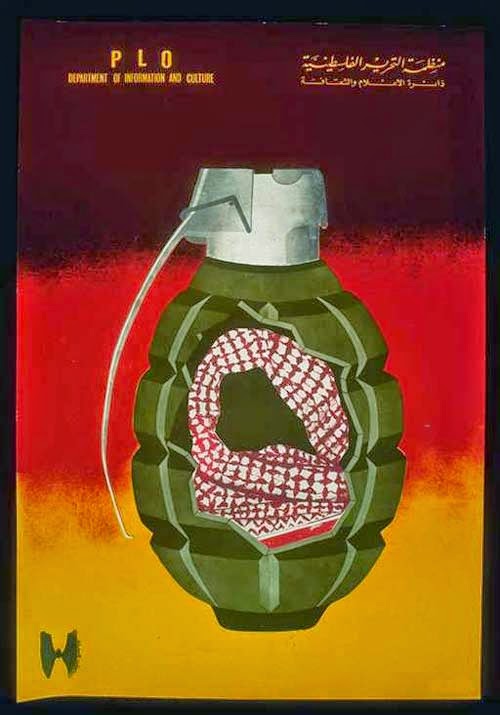There is an elephant in the room, that Palestinian Arab culture is suffused with glorification of violence and terror acts. And that is part of what I was calling attention to by commenting on "Palestine" joining an educational and cultural institution.
Amazingly, the new UNESCO head seems to have noticed this, at least in terms of Palestinian Arab poster art:
The head of UNESCO vetoed the inclusion of a vast collection of Palestine-themed posters in a register of world heritage, arguing that the posters fuel hatred and anti-Semitism, The Times of Israel has learned.She is of course right. The entire collection can be seen here, and there are many posters that glorify terror as well as gleefully call for the destruction of Israel:
The decision by Irina Bokova to block the Liberation Graphics Collection of Palestine Posters from being accepted into UNESCO’s Memory of the World program marks the first time such a nomination has been vetoed.
The collection was initially accepted by an advisory board but then blocked by Bokova, who said some of the posters were “totally unacceptable” and “run counter to the values of UNESCO,” the UN’s Educational, Scientific and Cultural Organization.
Besides universal themes of occupation and the motifs depicting the struggle for liberation and peace — such as barbed wire and white doves — many of the posters feature machine guns and hand grenades, extolling armed resistance and terrorism. Some of the posters glorify Palestinian suicide attacks and other murderous missions against Israeli civilians, including a 1978 massacre known in Israel as the bloodiest terror attack in the country’s history.
In August, the collection — which includes some 1,700 posters celebrating the Palestinian national liberation movement — was accepted for formal review by UNESCO’s International Memory of the World Register, which strives to preserve archival holdings of “world significance and outstanding universal value.”
Usually, nominations are considered by an international advisory board, and, if approved, confirmed by the organization’s director-general. In this particular case, too, the board reviewed the nomination and none of its members raised any concerns, which indicated that the board would recommend that the director-general formally accept the collection into the register.
However in this case, Bokova, surprised that no one had raised any objections to the posters, said she has decided to block the collection’s approval.
“In my capacity of Director General of UNESCO, I will oppose any such proposal for inscription,” she wrote in a December 23 letter to the chair of the advisory board, Helena Asamoah-Hassan. Some of the posters “would seem totally unacceptable and run counter to the values of UNESCO and its aspiration to build peace in the minds of men and women,” Bokova wrote.
And some posters are undeniably antisemitic:
This worship of hate and violence is so embedded in Palestinian Arab culture that the UNESCO board could not find any problems with this artwork - how else would Palestinians celebrate their culture?
Bokova's decision wipes away the fog of willful ignorance around this aspect of Palestinian "culture" (a culture that, as I noted previously, did not seem to produce any poster art before 1967.)
It is sad that the world's standards for how Palestinian Arabs are expected to act is so low that this collection did not even raise eyebrows at UNESCO until now. It is astonishing that the head of UNESCO has publicly exposed the elephant.
UPDATE: UNESCO denies everything in this story, says that the collection is still under consideration. (h/t Ian)







